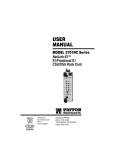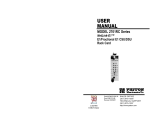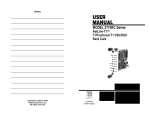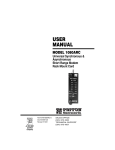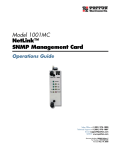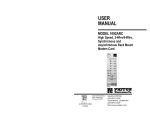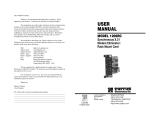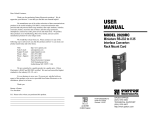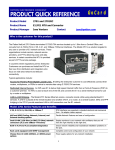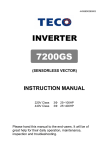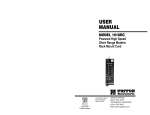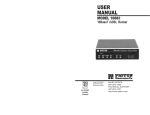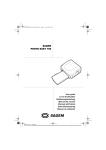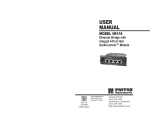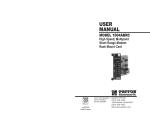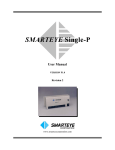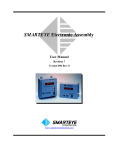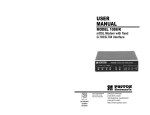Download Model 2707RC User Manual
Transcript
USER MANUAL MODEL 2707RC NetLink-E1TM E1 CSU/DSU Rack Card Part# 07M2707RC-A Doc# 086221UA Revised 10/19/01 An ISO-9001 Certified Company SALES OFFICE (301) 975-1000 TECHNICAL SUPPORT (301) 975-1007 1.0 1.1 1.2 1.3 1.4 Warranty Information .................................................................. 4 Warranty Statement...................................................................... 4 Radio and TV Interference............................................................ 4 CE Notice...................................................................................... 5 Service Information....................................................................... 5 2.0 2.1 2.2 General Information..................................................................... 6 Features........................................................................................ 6 General Product Description......................................................... 6 3.0 3.1 Configuration ............................................................................... 7 DIP Switch Configuration.............................................................. 7 Switch S1-1 through S1-8............................................................. 8 Switch S1-1: Line Coding ............................................................. 8 Switch S1-3: Line Build-out Impedance........................................ 9 S1-6 and S1-7 Clock Modes......................................................... 9 Switch S1-8: Loopback tests ...................................................... 10 Switch S3: DIP switch or NMS (network management system) control ......................................................................... 10 Hardware Reset .................................................................. 10 NMS Control. ....................................................................... 10 Setting the card address. .................................................... 11 DCE/DTE selector (X.21 version only) ....................................... 12 Configuring The Rear Interface Card.......................................... 12 Model 1001RCM12548C Strap Settings .................................... 14 DTE Shield (DB-25 Pin 1) & FRGND (JB3) ......................... 15 SGND & FRGND (JB4) ....................................................... 15 Model 1001RCM13448C Strap Settings .................................... 16 DTE Shield (M/34 Pin A) & FRGND (JB3). ......................... 17 SGND & FRGND (JB4). ...................................................... 17 Model 1001RCM11548C Strap Settings .................................... 17 DTE Shield (DB-15 Pin 1) & FRGND (JB3) ......................... 18 SGND & FRGND (JB4) ....................................................... 19 Model 1001RCM11575 Strap Settings ....................................... 19 3.2 3.3 4.0 4.1 4.2 4.3 4.4 4.5 4.6 5.0 5.1 5.2 Installation.................................................................................. 21 The Model 1001R14 Rack Chassis ............................................ 21 The Rack Power Supply ............................................................. 21 Powering up Your 1001R14 Rack .............................................. 22 Installing The Model 2707RC Into The Chassis ......................... 22 Connecting to a DTE Device ...................................................... 22 Connecting to a DCE Device ...................................................... 22 Connecting the E1 Interface ....................................................... 23 Connecting Dual Coax BNC (75 Ohm) ....................................... 23 Operation.................................................................................... 24 LED Descriptions ........................................................................ 24 LOCAL LOOP DIAGNOSTICS ................................................... 25 Operating local loopback (LLB) .................................................. 25 2 A Specifications ............................................................................ 26 B Cable Recommendations.......................................................... 27 C Factory Replacement Parts And Accessories ........................ 28 D E1 Interface Pin Assignment .................................................... 29 E V.35 Interface Pin Assignment ................................................. 30 F EIA-530 Interface Pin Assignment ........................................... 31 G X.21 Interface Pin Assignment ................................................. 32 3 1.0 WARRANTY INFORMATION Thank you for your purchase of this Patton Electronics product. This product has been thoroughly inspected and tested and is warranted for One Year parts and labor. If any questions or problems arise during installation or use of this product, please do not hesitate to contact Patton Electronics Technical Services at (301) 975-1007. 1.1 WARRANTY STATEMENT Patton Electronics warrants all Model 2707RC Series components to be free from defects, and will—at our option—repair or replace the product should it fail within one year from the first date of shipment. This warranty is limited to defects in workmanship or materials, and does not cover customer damage, abuse, or unauthorized modification. This product contains no serviceable parts; therefore the user shall not attempt to modify the unit in any way. If this product fails or does not perform as warranted, your sole recourse shall be repair or replacement as described above. Under no condition shall Patton Electronics be liable for any damages incurred by the use of this product. These damages include, but are not limited to, the following: lost profits, lost savings and incidental or consequential damages arising from the use of or inability to use this product. Patton Electronics specifically disclaims all other warranties, expressed or implied, and the installation or use of this product shall be deemed an acceptance of these terms by the user. In the event the user detects intermittent or continuous product malfunction due to nearby high power transmitting radio frequency equipment, the user is strongly advised to use only data cables with an external outer shield bonded to a metal or metallized connector. 1.2 RADIO AND TV INTERFERENCE The Model 2707RC generates and uses radio frequency energy, and if not installed and used properly—that is, in strict accordance with the manufacturer's instructions—may cause interference to radio and television reception. The Model 2707RC has been tested and found to comply with the limits for a Class A computing device in accordance with the specifications in Subpart B of Part 15 of FCC rules, which are designed to provide reasonable protection from such interference in a commercial installation. However, there is no guarantee that interference will not occur in a particular installation. If the Model 2707RC does cause interference to radio or television reception, which can be determined by disconnecting the cables, the user is encouraged to try to correct the interference by one or more of the following measures: moving the computing equipment away from the receiver, re-orienting the receiving antenna, and/or plugging the receiving equipment into a different AC outlet (such that the computing equipment and receiver are on different branches). 4 1.3 CE NOTICE The CE symbol on your Patton Electronics equipment indicates that it is in compliance with the Electromagnetic Compatibility (EMC) directive of the European Union (EU). A Certificate of Compliance is available by contacting Patton Electronics Technical Support. 1.4 SERVICE INFORMATION All warranty and non-warranty repairs must be returned freight prepaid and insured to Patton Electronics. All returns must have a Return Materials Authorization number on the outside of the shipping container. This number may be obtained from Patton Electronics Technical Support at: tel: (301) 975-1007 email: [email protected] www: http://www.patton.com Note Packages received without an RMA number will not be accepted. Patton Electronics' technical staff is also available to answer any questions that might arise concerning the installation or use of your Patton Model 2707RC. Technical Services hours: 8AM to 5PM EST, Monday through Friday. 5 2.0 GENERAL INFORMATION Thank you for your purchase of this Patton Electronics product. This product has been thoroughly inspected and tested and is warranted for One Year parts and labor. If any questions arise during installation or use of the unit, contact Patton Electronics Technical Services at (301) 975-1007. 2.1 FEATURES • Terminates E1/G.703 circuits over a 4-wire RJ-48C interface • Connects to standard CPE serial and 10Base-T interfaces • Unstructured rate of 2.048 Mbps (G.703) • Selectable AMI or HDB3 line coding • Configuration via internal DIP switches or SNMP management of local unit through the 1001MC • Six easy-to-read LED indicators monitor data and diagnostics • Internal, external, network clocking • also operates as a high-speed point-to-point modem • Fits into Patton’s 2U rack-mount chassis • Made in USA • Conforms to ONP requirement CTR12 for connection to international telecom networks 2.2 GENERAL PRODUCT DESCRIPTION The Model 2707RC Series are single port E1 CSU/DSUs that provide high-speed WAN connectivity in a rack card package. Connecting to the serial WAN port of a switch, router or multiplexer, the NetLink-E1™ provides E1 access connection at data rates of 2.048 Mbps. The NetLinkE1™ is an excellent choice when terminating leased line services, Frame Relay backbones, internet access as well as LAN-to-LAN services. The Netlink-E1™ provides digital access to local WAN services between two facilities over a dedicated 4-Wire circuit. Clock modes, line impedance, and coding options are programmed via internally accessible DIP switches or SNMP manageable through the 1001MC. The Netlink-E1™ uses AMI and HDB3 line coding. Netlink-E1™ also supports a full range of system and diagnostic features that make system setup easy. The NetLink-E1 provides E1 terminations over a modular RJ-48C jack or dual 75 Ohm BNC connectors when using the 1001RCM11575 (X.21) rear card. 6 3.0 CONFIGURATION The 2707RC features configuration capability via hardware DIP switches or SNMP through Patton’s Model 1001MC Management Card. This section describes all possible hardware and software switch configurations of the network connection. Note The 2707RC factory default is set to DIP switch control. Software control can be enabled by setting S3 to a valid address SNMP management station. Performing a hardware reset sets the unit for dip switch control. 3.1 DIP SWITCH CONFIGURATION The Model 2707RC has two eight bit DIP switches that allow configuration for a wide range of applications. The switches are accessed by removing the card from the chassis.Figure 1 shows the location of the DIP switches on the top of the printed circuit board. ON 1 ON 2 3 4 5 S3 6 7 8 1 2 3 4 5 6 7 8 S1 Figure 1. Model 2707RC Series top view, showing location of DIP switches. DIP Switches S1 and S3 can be configured as either “On” or “Off”. Figure 2 shows the orientation of the DIP switches with respect to ON/ OFF positions. Default position and descriptions for Switches S1 and S3 are provided on the next page. 7 Figure 2. Close up of DIP switches showing ON/OFF positions. Note If you do not have a terminal, you may force the unit to use the DIP switches as the default configuration source by turning off the unit, setting all the DIP switches to the ON position, then powering on the unit. This will cause the unit to enter a special mode. Then turn off the unit and change the switch settings to the desired settings. When you turn the unit on again, the unit will be set up with the selected switch settings. Switch S1-1 through S1-8 A detailed description of each switch (S1-1 through S1-8) setting follows the summary table below. Table 1: Switch Set 1 Summary Position Function Factory Default S1-1 S1-2 S1-3 S1-4 S1-5 S1-6 S1-7 S1-8 Line Coding Reserved Line Build Out Reserved Reserved Clocking Mode Clocking Mode TM from DTE OFF OFF OFF OFF OFF OFF OFF OFF Selected Option HDB3 120 ohm Network Network Enabled Switch S1-1: Line Coding Use switch S1-1 to control the network line coding. Set these options to be the same as the line coding given to you by your service provider. If 8 you are using two Model 2707s together as short-range modems, set both units to HDB3. Table 2: S1-1 Line Coding settings S1-1 Line Coding Off On HDB3 AMI Switch S1-3: Line Build-out Impedance Switch S1-3 is used to select line build-out (LBO) impedance for the Model 2707’s E1 port. Your Model 2707RC comes equipped with either an RJ-48C connector, dual BNC connectors, or both. When connecting to the E1 network, the LBO selection must match the connector type. If the dual BNC connectors are used, the line build-out impedance must be set to 75-ohm. Otherwise, for the RJ-48C connector, impedance should be set to 120 ohm. Table 3: S1-3 Line Build-out settings S1-3 Setting 75 ohm 120 ohm On Off S1-6 and S1-7 Clock Modes Set switch S1-6 and S1-7 to determine the 2707RC’s transmitter timing. Table 4: S1-6 and S1-7 Clock Modes S1-6 S1-7 Clock Mode On On Off Off On Off On Off Network (Received Recovered) Internal External Network (Received Recovered) Network Clock Internal Clock External Clock Transmitter timing is derived using the received line signal (received recovered) from the network. Transmitter timing is derived from an internal clock source. Transmitter timing is derived from DTE terminal timing. (Units equipped with 10Base-T modules do not operate in external clock mode. They enter internal clock mode when this setting is selected.) 9 Switch S1-8: Loopback tests Use switch S1-8 to allow the Model 2707RC to enter loopbact test mode when the DTE raises the appropriate loop request pin. Table 5: S1-8 Loopback test settings S1-8 Setting Off On DTE loopback request enabled DTE loopback request disabled Switch S3: DIP switch or NMS (network management system) control The Model 2707RC can be configured and managed via DIP switches, or NMS-SNMP/HTTP through a Patton Model 1001MC management card acting as a proxy agent. (refer to the 1001MC user manual when using this mode). Switch S3 selects control and management mode for the Model 2707RC. Table 6: S3 DIP switch settings S3-1 to S3-8 Management selection All set to Off All set to On DIP switch control (factory default) Hardware reset Hardware Reset . The Model 2707RC is set at the factory for DIP switch control. If the user has changed control to NMS, and then needs to revert to DIP switch control, use the following procedure: 1. Pull the Model 2707RC out of the rack. 2. Set all switches (S1 and S3) to the ON position. 3. Install the card into the rack and power up the unit. 4. Pull the card out again and change the switches to the desired settings. The unit is now under DIP switch control. 5. Install the card back into the rack. NMS Control. When switches S3-1 to S3-8 are set to a setting other than the ones shown in Table 6, the Model 2707RC enters NMS control. While under NMS control, each of the Model 2707RC cards housed in a rack must have an address. Table 7 and Figure 3 show examples of address settings. The table follows the hexadecimal system, where switch SW3-1 is the least significant bit (LSB), and SW3-8 is the most 10 significant bit (MSB). A switch in the On position represents binary zero, and Off represents binary one (see Figure 3). Table 7: Examples of the address settings Hex Address (Decimal Address) S3-8 S3-7 S3-6 S3-5 S3-4 S3-3 S3-2 S3-1 0x01 (1) 0x02 (2) 0x10(16) 0xB5(181) ON ON ON OFF ON ON ON ON ON ON ON OFF ON ON OFF OFF ON ON ON ON ON ON ON OFF ON OFF ON ON OFF ON ON OFF Hexadecimal Address Decimal Address 0x01 (1) 1 Least significant bit (MSB) Most significant bit (LSB) ON 1 2 3 4 5 6 7 8 2 3 4 5 6 7 8 2 3 4 5 6 7 8 2 3 4 5 6 7 8 On = binary 0 Off = binary 1 ON 0x02 (2) 2 1 ON 0x10 (16) 16 1 ON 0xB5 (181) 181 1 Figure 3. Sample DIP switch settings Setting the card address. Table 7 and Figure 3 show examples of how to set a card address using switches S3-1 through S3-8. The addresses are listed in their hexadecimal (hex) and corresponding decimal values. 11 1 TM Link TXD ON RXD Model 2707RC In this example, the DCE/DTE strap is configured for DTE because the DTE label on the strap is pointed toward the front panel ON 1 2 3 4 5 6 7 2 3 4 5 6 7 8 8 Figure 4. DCE/DTE selector strap location 3.2 DCE/DTE SELECTOR (X.21 VERSION ONLY) The X.21 version of the 2707RC can be set up as a DCE (default) or DTE device by using a DCE/DTE selector strap (see Figure 4). The information in Table 8 describes configuring the DCE/DTE strap. Table 8: DCE/DTE selector settings Setting Description DCE To set a rack card as a DCE device, install the DCE/DTE selector with the DCE arrows pointing toward the front panel. To set a rack card as a DTE device, install the DCE/DTE selector with the DTE arrows pointing toward the front panel. DTE 3.3 CONFIGURING THE REAR INTERFACE CARD The Model 2707RC Series has five interface card options: the Model 1001RCM12548C (DB-25/RJ-48C), the Model 1001RCM13448C (M/34/ RJ-48C), the Model 1001RCM11548C (DB-15/RJ-48C), the Model 1001RCM11575 (DB-15/Dual BNC), and the model IM2RC/IA (RJ-48C/ 12 RJ-45). Each of these options supports one DTE interface connection and one 4-wire RJ-48C or dual-BNC line connection. Figure 5 illustrates the five different interface options for the Model 2707RC Series. Model Model Model Model 1001RCM11575 1001RCM11548C 1001RCM12548C 1001RCM13448C Dual BNC RJ-48C RJ-48C RJ-48C DB-15 F DB-15 F DB-25 F Model IM2RC/IA RJ-48C M/34 F Figure 5. Model 2707RC Series interface card options. Note The 2707RC Series rear cards are specifically designed to operate with the E1 function card and must not be swapped with other Patton function cards. Prior to installation, you will need to examine the rear card you have selected and make sure it is properly configured for your application. Each rear card is configured by setting straps located on the PC board. To configure the rear cards, you must set the configuration straps. Figure 6 shows the orientation of these straps. Each strap can either be on pins 1 and 2, or on pins 2 and 3. Figure 6. Orientation of Interface Card Straps Sections “Model 1001RCM12548C Strap Settings”,“Model 1001RCM13448C Strap Settings”, and “Model 1001RCM11548C Strap 13 Settings” describe the strap locations and possible settings for each rear card. Model 1001RCM12548C Strap Settings Figure 7 shows strap locations for the Model 1001RCM12548C (DB-25) rear cards. These straps determine various grounding characteristics for the terminal interface and twisted pair lines. JB3 and JB4 are user configurable. 1 3 JB 3 4 JB 1 2 3 Figure 7. 1001RCM125XX strap locations. Table 9 provides an overview of interface strap functions for the rear interface cards. Following the table overview are detailed descriptions of each strap’s function. Table 9: Interface Card Strap Summary Strap JB3 JB4 Function Position 1&2 DTE Shield (Pin1) & FRGND Connected* FRGND & SGND Connected* * Indicates default setting 14 Position 2&3 Open Open DTE Shield (DB-25 Pin 1) & FRGND (JB3). In the connected position, this strap links DB-25 pin 1 & frame ground. In the open position, pin 1 is disconnected from frame ground (see Table 10) Table 10: JB3 strap settings Position Description 1&2 2&3 SGND (Pin 7) and FRGND Connected through a 100 ohm resistor DTE Shield (Pin 1) and FRGND Not Connected SGND & FRGND (JB4). In the connected position, this strap links DB-25 pin 7 (Signal Ground) and frame ground through a 100 ohm resistor. In the open position, pin 7 is connected directly to frame ground (see Table 11) Table 11: JB4 strap settings Position Description 1&2 2&3 SGND (Pin 7) and FRGND Connected through a 100 ohm resistor SGND (Pin 7) and FRGND Directly Connected 15 Model 1001RCM13448C Strap Settings Figure 8 shows the strap location for the Model 1001RCM13448C (M/34) rear card. This strap determines whether Signal Ground and Frame Ground will be connected. 1 JB 3 3 4 JB 1 2 3 Figure 8. 1001RCM13448C strap locations. Table 12 provides an overview of interface strap functions for the rear interface cards. Following the table overview are detailed descriptions of each strap’s function. Table 12: Interface Card Strap Summary Strap JB3 JB4 Function Position 1&2 DTE Shield (Pin A) & FRGND Connected* FRGND & SGND (Pin B) Connected* * Indicates default setting 16 Position 2&3 Open Open DTE Shield (M/34 Pin A) & FRGND (JB3). In the connected position, this strap links M/34 pin A & frame ground. In the open position, pin A is disconnected from frame ground (see Table 13). Table 13: JB3 strap settings Position 1&2 2&3 Description DTE Shield (Pin A) and FRGND Connection DTE Shield (Pin A) and FRGND Not Connected SGND & FRGND (JB4). In the connected position, this strap links Signal Ground and frame ground through a 100 ohm resistor. In the open position, signal ground is disconnected from frame ground (see Table 14). Table 14: JB4 strap settings Position 1&2 2&3 Description SGND and FRGND Connected SGND and FRGND Not Connected Model 1001RCM11548C Strap Settings Figure 9 on page 18 shows strap locations for the Model 1001RCM11548C (DB-15) rear cards. These straps determine various grounding characteristics for the terminal interface and twisted pair lines. JB3 and JB4 are user configurable. 17 1 JB 3 3 4 JB 1 2 3 Figure 9. 1001RCM11548C strap locations. Table 15 provides an overview of interface strap functions for the rear interface cards. Following the table overview are detailed descriptions of each strap’s function. Table 15: Interface Card Strap Summary Strap JB3 JB4 Function Position 1&2 DTE Shield (Pin1) & FRGND Connected* FRGND & SGND (Pin 8) Connected* * Indicates default setting Position 2&3 Open Open DTE Shield (DB-15 Pin 1) & FRGND (JB3). In the connected position, this strap links DB-15 pin 1 & frame ground. In the open position, pin 1 is disconnected from frame ground (see Table 16). Table 16: JB3 strap settings Position 1&2 2&3 Description DTE Shield (Pin 1) and FRGND Connected DTE Shield (Pin 1) and FRGND Not Connected 18 SGND & FRGND (JB4). In the connected position, this strap links DB-15 pin 8 (Signal Ground) and frame ground through a 100 ohm resistor. In the open position, pin 8 is connected directly to frame ground (see Table 17). Table 17: JB4 strap settings Position Description 1&2 2&3 SGND (Pin 8) and FRGND Connected through a 100 ohm resistor SGND (Pin 8) and FRGND Directly Connected Model 1001RCM11575 Strap Settings Figure 10 shows strap locations for the Model 1001RCM11575 (DB-15/ Dual BNC) rear cards. Figure 8 shows strap locations for the Model 1001RCM11548C (DB-15) rear cards. These straps determine various grounding characteristics for the terminal interface and twisted pair lines. JB3 and JB4 are user configurable. 3 JB B4 J 1 3 1 3 Figure 10. 1001RCM11575 strap locations. 19 . Table 18: Interface Card Strap Summary Strap JB3 JB4 Function Position 1&2 DTE Shield (Pin1) & FRGND Connected* FRGND & SGND (Pin 8) Connected* * Indicates default setting 20 Position 2&3 Open Open 4.0 INSTALLATION This section describes the functions of the Model 1001R14 rack chassis, tells how to install front and rear Model 2707RC Series cards into the chassis, and how to connect to the twisted pair interface and the serial interface. 4.1 THE MODEL 1001R14 RACK CHASSIS The Model 1001R14 Rack Chassis (Figure 9, below) has fourteen or sixteen device card slots, plus a single power supply or dual redundant power supplies. Measuring only 3.5” high, the Model 1001R14 is designed to occupy only 2U in a 19” rack. Sturdy front handles allow the Model 1001R14 to be extracted and transported conveniently. Figure 11. Model 1001R14 Rack Chassis with power supply. The Rack Power Supply The power supply included in the Model 1001R14 rack uses the same mid-plane architecture as the modem cards. The front card of the power supply slides in from the front, and the rear card slides in from the rear. They plug into one another in the middle of the rack. The front card is then secured by thumb screws and the rear card by conventional metal screws. WARNING There are no user-serviceable parts in the power supply section of the Model 1001R14 rack. Voltage setting changes and fuse replacement should only be performed by qualified service personnel. Contact Patton Electronics Technical support at +1 (301) 9751007, via our web site at www.patton.com, or by Email at [email protected], for more information. 21 Powering up Your 1001R14 Rack The power supplies that come with your 1001R14 rack system are equipped with a power entry connector on the rear power supply card. The power supplies are Hot-Swappable, so you are not required to remove the cards from the rack while applying power to the system. Note Please refer to the Model 1001R14 Series User Manual AC and DC Rack Mount Power Supplies for fuse and power card replacement information. 4.2 INSTALLING THE MODEL 2707RC INTO THE CHASSIS The Model 2707RC is comprised of a front card and a rear card. The two cards meet inside the rack chassis and plug into each other by way of mating 50 pin card edge connectors. Use the following steps as a guideline for installing each Model 2707RC into the rack chassis: 1. Slide the rear card into the back of the chassis along the metal rails provided. 2. Secure the rear card using the metal screws provided. 3. Slide the card into the front of the chassis. It should meet the rear card when it’s almost all the way into the chassis. 4. Push the front card gently into the card-edge receptacle of the rear card. It should “click” into place. 5. Secure the front card using the thumb screws. Note Since the Model 1001R14 chassis allows “hot swapping” of cards, it is not necessary to power down the rack when you install or remove a Model 2707RC. 4.3 CONNECTING TO A DTE DEVICE The serial port on most rear interface cards are hard-wired as “DCE” (data communications equipment). The interfaces are designed to plug into a DTE such as a terminal, PC or host computer. When making the connection to your DTE device, use a “straight through” cable of the shortest possible length--we recommend 6 feet or less. When purchasing or constructing an interface cable, please refer to the pin diagrams in Appendix E on page 30, Appendix F on page 31, and Appendix G on page 32 as guides. 4.4 CONNECTING TO A DCE DEVICE The rear interface cards on most interface modules are hard wired as “DCE”. Therefore, you must use a null modem cable when connecting to 22 a modem, multiplexer or other DCE device. This cable should be of the shortest possible length--we recommend 6 feet or less. When purchasing or constructing a null modem interface cable, use the pin diagrams in Appendix E on page 30, Appendix F on page 31, and Appendix G on page 32 as guides. Note Pin-out requirements for null modem applications vary between equipment manufacturers. If you have any questions about a specific installation, please contact Patton Electronics Technical Support. 4.5 CONNECTING THE E1 INTERFACE The Network Line Interface is an eight position keyed modular jack configured as a RJ-48C. This interface will need to be configured to match the line parameters (i.e. framing, line coding, etc.) supplied by the central office. Figure 12. NetLink-E1™ twisted pair line interface. Note If the NetLink-E1™ is being used for private short range modem applications, the twisted pair cable connected to its port will need to be a cross-over cable. See Appendix D on page 29 for Interface pin assignments. 4.6 CONNECTING DUAL COAX BNC (75 OHM) In addition to the 120 Ohm twisted pair connection, the Model 2707RC, when used with the 1001RCM11575 rear card, is equipped with dual female BNCs (TX and RX) for connection to a 75 ohm dual coax G.703 network interface. 23 5.0 OPERATION Once the NetLink-E1™ is installed and configured properly it is ready to place into operation. This section describes the function of the LED indicators, and the use of the loopback and pattern test modes. 5.1 LED DESCRIPTIONS The NetLink-E1™ is equipped with nine LED indicators that monitor the status of communication. Figure 13 shows the location of the LEDs on the NetLink-E1™ Series front panel. Model 2707RC TXD RXD Link TM LLB Figure 13. Model 2707RC front panel, showing LED indicators. TXD RXD Link TM When the unit sends a one, the TXD LED is green. When it sends a zero, the TXD LED is yellow. Moreover, the TXD LED is active only in active DS0 channels. In inactive channels, the TXD LED is off. When the unit receives a one, the RXD LED is green. When it receives a zero, the RXD LED is yellow. Moreover, the RXD LED is active only in active DS0 channels. In inactive channels, the RXD LED is off. The Link LED is green when it detects a live E1 network connection by the 2707RC’s E1 port. The Link LED remains off if there is no connection to the E1 network. The Test Mode LED will briefly blink yellow to indicate that the Model 2707RC is in local loopback mode. 24 5.2 LOCAL LOOP DIAGNOSTICS The NetLink-E1 offers local loop diagnostics. Local loop is useful when isolating installation or performance problems. The Model 2707RC local loop is initiated via the front panel toggle switch labeled LLB. Operating local loopback (LLB) The local loopback (LLB) test checks the operation of the local NetLinkE1, and is performed separately on each unit. Any data sent to the local NetLink-E1 in this test mode will be echoed (returned) to the user device (for example, characters typed on the keyboard of a terminal will appear on the terminal screen) To perform an LL test, do the following: 1. Activate LL. This can be done in any of the following ways: — Enter Local Loop from the NMS Diagnostics/Statistics menu and select the Local Loop option from the drop-down menus — Activate the LL signal on the DTE. If you are not sure which lead is the LL signal, refer to Appendix D on page 29 — Toggle the front panel switch to the Local position 2. Verify that the data terminal equipment is operating properly and can be used for a test. 3. Perform a BER test (bit error rate). If the BER test equipment indicates no faults, but the data terminal indicates a fault, follow the manufacturer’s checkout procedures for the data tereminal. Also, check the interface cable between the terminal and the NetLink-E1. 25 APPENDIX A SPECIFICATIONS Network Data Rate: Network Connector: Nominal Impedance: DTE Interface: Line Coding: Line Framing: Clocking: DTE Data Rate: Indicators: Configuration: Powered by 1001R14 Rack Power Supply: Humidity: Temperature: Dimensions: 2.048 Mbps RJ-48C or dual BNC 120 ohm (75 ohm available when using Patton Model 1001RCM11575 rear card) V.35, X.21 (DCE or DTE orientation), 10Base-T, Ethernet Selectable AMI or HDB3 G.703 (Unframed) Internal, External, or Receive Recover 2.048 Mbps Transmit Data, Receive Data, Test Mode, Link Two 8-Position DIP Switches or SNMP Manageable 100–240 VAC, 50–60 Hz Up to 90% non-condensing 0 to 50º C (32–122°F) 9.0L x 5.3W x 2.0H cm (3.5L x 2.1W x 0.78H) 26 APPENDIX B CABLE RECOMMENDATIONS The Patton NetLink E1™ Series has been performance tested by Patton technicians using twisted-pair cable with the following characteristics: Wire Gauge Capacitance Resistance 19 AWG 22 AWG 24 AWG 83nf/mi or 15.72 pf/ft. 83nf/mi or 15.72 pf/ft. 83nf/mi or 15.72 pf/ft. .0163 Ohms/ft. .0326 Ohms/ft. .05165 Ohms/ft. To gain optimum performance from the Model 2707RC Series, please keep the following guidelines in mind: • Always use twisted pair wire—this is not an option. • Use twisted pair wire with a capacitance of 20pf/ft or less. • Avoid twisted pair wire thinner than 26 AWG (i.e. avoid AWG numbers higher than 26). • Use of twisted pair with a resistance greater than the above specifications may cause a reduction in maximum distance obtainable. Functionality should not be affected. • Many environmental factors can affect the maximum distance obtainable at a particular site. 27 APPENDIX C FACTORY REPLACEMENT PARTS AND ACCESSORIES Patton Model # 2707RC/D/V 2707RC/B/B 2707RC/A/I 1001RPEM-RAC 1001RPEM-RAC 1001RPSM-RUI 1001RPEM-RDC 1001RPSM-R48A 1001R14P 1001R14P/R48V 1001R14P/RUIA 1001R14P/RUIC 1001R14P/RUID 1001R14P/RUIG 1001R14P/RUIK 1001RCM12548C 1001RCM13448C 1001CC IM2RC/B 05R16BP440W 05R16FP440W 0516FPB1 0516FPB4 0516RPB1 0516RPB4 056S1 10-25M/35M-1 1010-10 07M2707RC Description E1/FE1 CSU/DSU Rack Card, X.21 Interface w/ DB15FS/RJ48C rear card E1/FE1 CSU/DSU Rack Card, RS530\ Interface with DB25F/RJ48C Rear Card E1/FE1 CSU/DSU Rack Card, V.35 Interface with M/ 34F/RJ48C Rear Card 120/240V Rear Power Entry Module 120/240V Rear Power Entry Module 120/240V Front Power Supply Module DC Rear Power Entry Module 48V Front Power Supply Module Rack 14 Slot 2U Chassis Only Rack 14 Slot 2U w/Dual Universal Input 48VDC Power Supplies Rack 14 Slot 2U w/Dual Universal Input 90-260VAC Power Supplies European Power Cord Rack 14 Slot 2U w/Dual Universal Input 90-260VAC Power Supplies Australia Power Cord Rack 14 Slot 2U w/Dual Universal Input 90-260VAC Power Supplies UK Power Cord Rack 14 Slot 2U w/Dual Universal Input 90-260VAC Power Supplies India Power Cord Rack 14 Slot 2U w/Dual Universal Input 90-260VAC Power Supplies US Power Cord DB-25/RJ-45 Rear Card M/34/RJ-45 Rear Card Control Card RS-530 Interface Rear Card Single Width Blank Rear Panel, White Single Width Blank Front Panel, White Single Width Blank Front Panel, Black 4-Wide Blank Front Panel, Black Single Width Blank Rear Panel, Black 4-Wide Blank Rear Panel, Black Set of 16 #4 pan head screws/washers Cable, 6 ft, DB-25 male to M/34 male Terminal Block, 2 Position, Male User Manual 28 APPENDIX D E1 INTERFACE PIN ASSIGNMENT RJ-48C E1 (DS0) NETWORK INTERFACE (FEMALE MODULAR JACK) Pin # Signal 1 2 RX Data (TIP 1) RX Data (RING1) 4 5 TX Data (TIP) TX Data (RING) } } From Network To Network 29 APPENDIX E V.35 INTERFACE PIN ASSIGNMENT M/34 CONNECTOR, TERMINAL INTERFACE Pin # Signal A B D E F L M N P R S T U V W X Y AA GND (Earth Ground/Shield) SGND (Signal Ground) CTS (DCE Source) DSR (DCE Source, Always On) CD (DCE Source) LL (Local Loop, DTE Source) TM (Test Mode Indicator, DCE Source) RL (Remote Loop, DTE Source) TD (Transmit Data +, DTE Source) RD (Receive Data +, DCE Source) TD/ (Transmit Data -, DTE Source) RD/ (Receive Data -, DCE Source) XTC (Transmit Clock +, DTE Source) RC (Receiver Clock +, DCE Source) XTC/ (Transmit Clock -, DTE Source) RC/ (Receiver Clock -, DCE Source) TC (Transmitter Clock +, DCE Source) TC/ (Transmitter Clock -, DCE Source) 30 APPENDIX F EIA-530 INTERFACE PIN ASSIGNMENT DB-25 FEMALE CONNECTOR, TERMINAL INTERFACE Pin # 1 2 3 4 5 6 7 8 9 10 11 12 13 14 15 16 17 18 19 20 21 22 23 24 25 Signal FG (FrameGround) TD (Transmit Data-A, DTE Source) RD (Receive Data-A, DCE Source) RTS (Request to Send-A, DTE Source) CTS (Clear to Send-A, DCE Source) DSR (Data Set Ready-A, DCE Source) SGND (Signal Ground) CD (Carrier Detect-A, DCE Source) RC/ (Receiver Clock-B, DCE Source) CD/ (Carrier Detect-B, DCE Source) XTC/(External Transmitter Clock-B, DTE Source) TC/(Transmitter Clock-B, DCE Source) CTS/(Clear to Send-B, DCE Source) TD/(Transmit Data-A, DTE Source) TC (Transmitter Clock-A, DCE Source) RD (Receive Data-A, DCE Source) RC (Receiver Clock-A, DCE Source) LL (Local LIne Loop) RTS/(Request to Send-B, DTE Source) DTR (Data Terminal Ready-A, DTE Source) RL (Remote Loopback) DSR/ (Data Set Ready-B, DCE Source) DTR/(Data Terminal Ready-B, DTE Source) XTC (External Transmitter Clock-A, DTE Source) TM (Test Mode) 31 APPENDIX G X.21 INTERFACE PIN ASSIGNMENT (DB-15 FEMALE CONNECTOR) (DTE /DCE CONFIGURATION) Pin # 1 2 3 4 5 6 7 8 9 10 11 12 13 14 Signal Frame Ground T (Transmit Data-A) C (Control-A) R (Receive Data-A) I (Indication-A) S (Signal Element Timing-A) BT (Byte Timing-A) SGND (Signal Ground) T/ (Transmit Data-B) C/ (Control-B) R/ (Receive Data-B) I/ (Indication-B) S/ (Signal Element Timing-B) BT/ (Byte Timing-B) 32
































